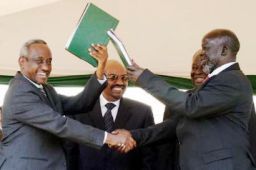Southern Sudan peace agreement in trouble – UN
Sept 13, 2006 (UNITED NATIONS) — A peace pact that ended a 21-year civil war in southern Sudan appears to be crumbling, with important pledges ignored or circumvented, according to a report by U.N. Secretary-General Kofi Annan late on Tuesday.
 The January 2005 agreement, if implemented, could signal a major change in Sudan, including power and wealth sharing and integrating security forces.
The January 2005 agreement, if implemented, could signal a major change in Sudan, including power and wealth sharing and integrating security forces.
But some of the basic tenets, including election planning and dividing oil revenues have not been met, as set out in the Comprehensive Peace Agreement (CPA) between the Khartoum government and the southern Sudan People’s Liberation Movement, the report to the U.N. Security Council said.
“While they are observing their security commitments reasonably well, the implementation of several other major provisions of this agreement has fallen behind schedule,” Annan wrote. “It is clear that implementing the CPA is a daunting challenge.”
The United Nations has some 10,000 peacekeepers in the south to monitor the agreement and help train police, human rights workers and provide other services.
It has set up a radio station where there was none but the Khartoum government has ignored an agreement with the world body and refused to allow broadcasts in the north.
Moreover, the U.N. Mission in Sudan, known as UNMIS, has not been permitted to monitor the oil-rich Abyei region. Sudan customs has also delayed the release “of a wide range of items, including food rations” and held some major communications equipment since February, the report said.
In the impoverished south where paved roads are rare, some 370 km (230 miles) of roads have been repaired, contributing to the return of over 10,000 refugees, food aid to 3 million people and polio immunization of 4.8 million children, the report said.
But donors have not lived up to their pledges, committing $430 million of the $2.6 billion needed for reconstruction. Annan also said that multi-donor trust funds, administered by the World Bank, “have proved ill-suited to meet immediate post-conflict requirements.”
Still, Annan said that a durable peace in the south would not take hold until the crisis in the western region of Darfur had been resolved. In recent months fighting has increased between rebels and government-backed militia, with the Sudanese military sending in troops and bombing villages.
Sudan has refused to allow the United Nations to take over peacekeeping duties in Darfur, now handled by under-financed and under-equipped African Union forces.
(Reuters)
